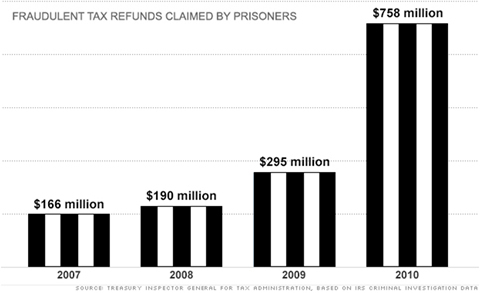Tax Fraud Committed by Prisoners Continues to Rise
By Amanda Hoang, Senior, Tax & Business
Tax fraud is a huge problem in the United States as more and more false returns are being filed each year claiming billions of dollars in fraudulent tax refunds. Such huge fraudulent refunds issued by the IRS have caused many taxpayers to be dissatisfied with the nation’s tax system.
One of the top group of perpetrators of such crime is prisoners. In 2010, false returns were filed by more than 91,000 inmates claiming $758 million in fraudulent refunds, as stated in an audit from the Treasury Inspector General for Tax Administration (TIGTA). As seen in Figure 1, this amount is more than those combined from 2007 to 2009, and more than double what it was in 2009. Of the $758 million claimed, $35 million refunds were actually issued by the IRS.
 |
| Figure 1 |
Although the numbers of fraudulent returns and claims made by prisoners have not yet been released for 2011 and 2012, it is speculated that the numbers have continued to rise in both years. Most inmates committing this crime often receive outside help in carrying out this task. They often use annual reports of big corporations that list the federal tax identification numbers that may be found in the prison libraries. The prisoner would then create false work records, claiming employment by these big corporations, then prepare Form 1040 claiming fraudulent refunds, and mail the returns to their families who would then submit them to the IRS.
Others have filed false returns claiming that they work for companies that have recently filed for bankruptcy, since such claims are more difficult to verify by the IRS.
Kevin Dunham, a Missouri inmate-who received help from his inmates’ families, was able to prepare and file false returns claiming $139,644 in fraudulent refunds. Of the amount claimed, $54,814 was received and split between those involved. He pleaded guilty last year for this crime.
Another inmate has also recently pleaded guilty to filing false returns claiming a total of $3.5 million in fraudulent refunds. Of the amount claimed, he received $3 million!
Efforts have been made to detect and prevent fraudulent tax refunds. However, since taxpayers can begin filing their tax returns in January and third-party employers are not required to submit payroll withholding documents until March 31, the delayed access to such third-party information has made it difficult for the IRS to detect such tax fraud at the time returns are processed.
TIGTA has suggested that the IRS wait until it receives third-party documentations, such as W-2 forms, before it issues refunds to prevent fraudulent refunds. Whatever the IRS decides to do, actions need to be taken to prevent this form of fraud and in restoring taxpayers’ confidence in our tax system.



















